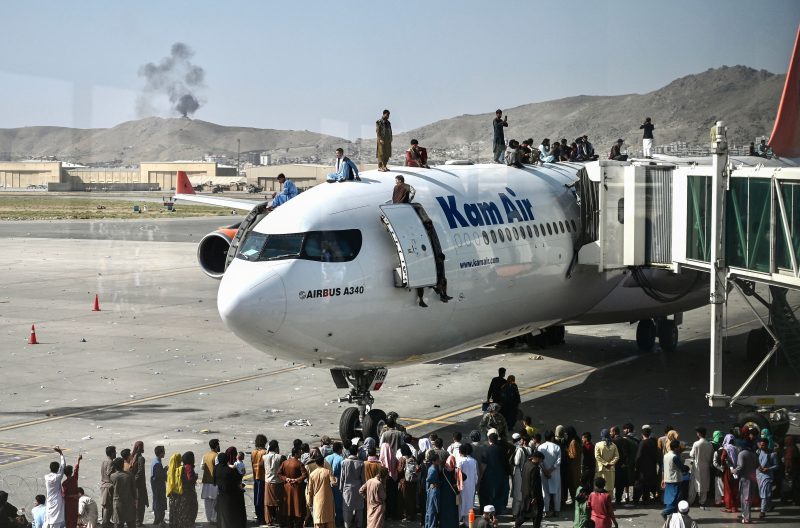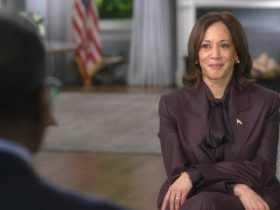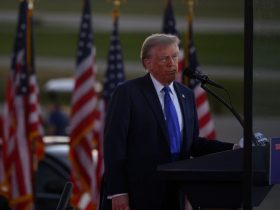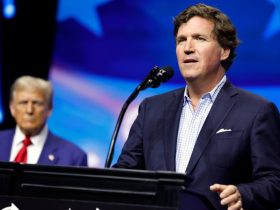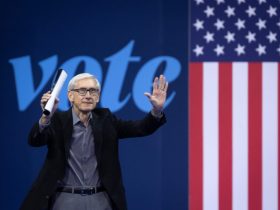When Joe Biden’s presidency began in 2021, Afghan official Nader Nadery knew that the new commander in chief was determined to pull U.S. troops from his country.
But Nadery, like other Afghans who feared the return of a repressive Taliban regime that had been overthrown in 2001, hoped he had an ally who could convince Biden to leave some forces behind until the Taliban agreed to a peace deal: Vice President Kamala Harris.
While Harris had backed Biden’s pledge to end the bloody and costly 20-year military operation, she had also been outspoken about protecting women and children after the United States pulled out. “I want to ensure that the country is on a path to stability, that we protect the gains that have been made for Afghan women and others,” Harris said in 2019 while running for president.
When the withdrawal turned chaotic and deadly in August 2021, with the Taliban taking over and women quickly losing many of their rights, Nadery and others wondered if Harris ever counseled the president to take a different course. “I hoped that President Biden listened to her and other voices who advocated for Afghan women,” said Nadery, who served as an adviser to then-Afghan President Ashraf Ghani.
Harris’s role behind the scenes in one of the most consequential and controversial episodes of Biden’s presidency shows how she has sought to position herself as a vice president deeply involved in key moments — even agreeing with an interviewer that she was the “last person in the room” with Biden as he cemented his plans to pull out the troops and evacuate allies.
But it also suggests the limits of her ability — or willingness — to meaningfully alter Biden’s course on historic choices. She raised important questions about the Afghanistan withdrawal before the calamitous, 17-day evacuation from Kabul but did not push for any alternative policy, according to officials who attended meetings that included her and who provided new details about the matter to The Washington Post.
One former senior military official involved in the deliberations said that Harris asked sharp questions “like a district attorney” during interagency meetings early in 2021 but revealed little about what she was thinking on the issue.
“She never gave a sense for where she was on it,” the senior military official said, speaking on the condition of anonymity because of the sensitivity of the issue.
Another former military official involved at the time said he does not recall Harris “playing any role of significance” during policy deliberations in 2021, but said it is possible she sought out Biden outside National Security Council meetings that he led.
Harris declined to comment. A Harris aide said in an emailed statement that the vice president was fully involved in briefings in which she asked “probing questions.” The aide said Harris “strongly supported President Biden’s decision to end America’s longest war,” adding, “We’re not going to get into the Vice President’s private counsel to the President.”
Republicans have hammered the Biden administration in congressional hearings about the deadly aftermath of the withdrawal, including an Islamic State suicide bombing that killed 13 U.S. troops and an estimated 170 Afghans. Former president Donald Trump also had made it a centerpiece of his campaign against Biden — but Harris’s role in the decision-making, thus far, has been little scrutinized.
Harris allies stressed that a vice president’s job is to privately give advice to the president and then march in lockstep after a decision is announced by the chief executive. Ron Klain, who was Biden’s chief of staff when the Afghanistan policy was decided and also worked for Biden and Al Gore when they were vice presidents, said he has often seen the second-in-command stuck within a “box” that precludes revealing any split from the boss.
“Al Gore found himself in that box. Joe Biden found himself in that box. And she [Harris] has found herself in that box,” Klain said. “You have to just be part of a team. You don’t get to argue your own brief” publicly.
There was precedent for a vice president splitting from a president on Afghanistan policy, though — one set by Biden years earlier when he served under President Barack Obama.
‘Boxed in’
As Obama prepared in 2009 to send tens of thousands more troops to Afghanistan, Biden’s view on the military intervention darkened amid the possibility that his son Beau, who had served in Iraq, might have to deploy there.
Biden sent a classified fax to Obama, arguing that the president’s plans were a mistake, and then wrote in his personal notebook that he was “thinking I should resign in protest over what will bring his administration down,” according to a special counsel’s report released this year on Biden’s handling of classified material.
But Biden also wrote that he felt “boxed in by knowing or at least feeling that my resignation would only harden his position and leave him with less voice.”
In private, Biden made clear his view that protecting Afghan women from the Taliban was not a cause worth U.S. military involvement. In a 2010 meeting with Richard Holbrooke, the Obama administration’s special envoy to Afghanistan and Pakistan, Biden said, according to Holbrooke’s diary: “I am not sending my boy back there to risk his life on behalf of women’s rights! It just won’t work, that’s not what they’re there for.”
Obama rejected Biden’s view and approved an increase in troops in December 2009 by more than 30,000, to more than 100,000 the following summer — although by the end of his time in office, he ultimately reduced the number of troops in Afghanistan to about 8,400. Trump as president then deliberated for months on how to handle Afghanistan after taking office in January 2017, approving a Pentagon request to increase troop numbers to about 14,000 that fall before souring on the conflict and changing course.
Meanwhile, Harris, who had been elected to the Senate in 2016, flew to Afghanistan in December 2018 as part of a bipartisan delegation that met with the top U.S. commander at the time, Gen. Austin “Scott” Miller, and stopped in Kabul, Kandahar and Mazar-e Sharif. The trip was low-profile, with no press engagements. Harris, in a statement after her visit, said she was “eager” to find a political solution that would allow American personnel to come home.
But she also made a point of emphasizing the risks for women in Afghanistan if the United States left. In August 2019, as she sought the Democratic presidential nomination, she laid out her vision for pulling troops from the country in a questionnaire from the Council on Foreign Relations, saying she would bring together military, national security and diplomatic officials to coordinate a plan that would ensure the country was stable and that “we protect the gains that have been made for Afghan women and others, and that it never again becomes a safe haven for terrorists.”
While the Democratic candidates in the 2020 primary all wanted to pull troops out, they diverged on the details of how that could be done without Afghanistan falling into chaos and again become a breeding ground for terrorists. Biden said that he would leave behind a small number of Special Forces “to be able to deal with the potential threat unless we got a real good negotiation accomplished to deal with terrorism.” Harris, before withdrawing from the race in December 2019, told the New York Times “the question is the type of presence,” saying she would give support to the Afghan government “in a way that they keep their country secure.”
The Trump administration in February 2020 signed a deal with the Taliban, promising to get all U.S. troops out of Afghanistan by May 2021 — a pledge Biden and Harris would be left to ponder after taking office.
‘The last person in the room’
In early 2021, Harris began meeting regularly with Biden about the details of pulling out troops from Afghanistan, according to Klain.
“She advised the president on that. She advised the president on the evacuation,” Klain said. He declined to disclose details of that advice.
Biden announced in April 2021 that U.S. troops would be withdrawn within months. Shortly after the decision, Harris was asked on CNN whether she was “the last person in the room” to express a view before Biden made his decision.
“Yes,” Harris responded.
“And you feel comfortable?” the CNN reporter asked.
“I do,” Harris responded.
A senior military official and a second former official familiar with the discussions said Biden’s views on the matter by that time appeared so deeply entrenched that they did not believe Harris was influential in his thinking.
Biden’s decision had gone against the advice of Defense Secretary Lloyd Austin and senior military officers, including Gen. Mark A. Milley, then chairman of the Joint Chiefs of Staff. They had recommended leaving a small force of about 2,500 troops to prop up the Afghan government, carry out counterterrorism operations and allow the U.S. intelligence community to keep a foothold in a country where numerous terrorist groups were based.
Adela Raz, who had been Afghanistan’s ambassador to the United Nations since 2019, moved in July 2021 to become Kabul’s representative in Washington. From that perch, Raz said in an interview, she watched as the Biden policy unfolded, and she feared for its impact on her homeland. But she said that she had no illusions that Harris could influence Biden to alter his decision because his mind was made up — and she also didn’t believe Afghanistan was a significant matter for the vice president.
“I’m not questioning her ability and capacity, not at all,” the former ambassador said. “Because I strongly believe in strong women, and I think she is one of those. But I felt, when I started to have conversation with the larger diplomatic community in Washington, that she was dealing was a challenging portfolio, and the issue of Afghanistan was not really brought into her file.”
As the withdrawal neared its conclusion in August, Afghanistan descended into chaos. Taliban militants launched a bloody, successful offensive against U.S.-backed Afghan forces, and security across the country crumbled. The Taliban seized control of Kabul on Aug. 15, forcing the Biden administration to scramble thousands of U.S. troops back to Afghanistan in what would become an exhausting, deadly effort to evacuate allies and officials.
More than 124,000 people were successfully airlifted to safety as the Taliban took power, but the operation was marked by scenes of desperate Afghans pleading for help — and then the deadly bombing at the edge of Kabul’s airport and an errant U.S. drone strike that killed an aid worker and nine other people, including seven children.
Nadery, who worked on peace negotiations with the Taliban, was traveling to Qatar to talk to Taliban officials about what he hoped would be a political settlement with that group and the Afghan government as the chaos broke out. He was never able to return to his homeland and now resides in the United States.
Fawzia Koofi, who had been the first female deputy speaker of Afghanistan’s parliament and who also was a government peace negotiator, said she, too, had hoped Harris would convince Biden to keep enough troops in the country to enable a peace deal to be made.
“We had hoped she would be able to at least influence the policies of President Biden,” she said, but has been left to wonder whether “the Biden policy influenced her.” Koofi, who was in Kabul when the Taliban took over, left shortly thereafter and now heads a group called Women for Afghanistan.
Harris, meanwhile, during the evacuation embarked on a previously scheduled trip to Singapore and Vietnam, where she was confronted with pointed questions about the violence thousands of miles away — and in particular the likely fate of women left behind.
“The Taliban claims it will respect women’s rights within Islamic law. How will the U.S. hold the Taliban accountable on this?” one reporter asked at an Aug. 26, 2021, news conference in Hanoi.
Harris responded: “I have worked almost my entire career on a number of issues but with a particular emphasis on the protection of women and children. And there’s no question that any of us who are paying attention are concerned about that issue in Afghanistan.” She pledged that the United States would work with allies to protect women and children in the region.
With the Taliban grabbing power, a coalition of women’s groups signed a letter in late August 2021 to Biden and Harris saying that “the very lives and futures of Afghan women and girls” were in “grave danger.” It said that “Vice President Kamala Harris has worked over many years for women’s rights, especially women of color” and appealed to her and Biden to protect their rights.
Asked what Harris did in the aftermath of the pullout to protect women and children, the Harris aide cited calls that she made to world leaders thanking them for their assistance in the evacuation.
“The Vice President has been a strong champion for the rights of women and girls around the world, and before and after the withdrawal she has always been focused on doing whatever we can to support the women of Afghanistan,” the aide in a statement.
A dramatic loss
Within weeks of the last U.S. plane leaving Kabul, the Taliban cracked down on women’s rights: enacting a ban on secondary female education, banning women from many jobs and requiring a strict dress codes with coverings from head to toe. Afghan women abruptly lost much of what they had gained during the 20 years that American troops were in the country.
Harris lamented that dramatic loss, posting on March 23, 2023, on social media: “I am deeply saddened by the first anniversary of the ban on girls’ secondary school attendance in Afghanistan, and by the prohibition on university education for Afghan women. We will never stop championing the rights of women and girls around the world.”
Such pronouncements left Afghans such as Nadery wondering if she had been able to similarly champion women’s rights with Biden as he plotted the American exit. Nadery said that while Harris supported humanitarian aid for Afghan women, he believes “she was less public about it” because of what he called Biden’s lack of interest in the issue and his strict control of information about the decision.
Sima Samar, chairwoman of the nongovernmental Afghanistan Human Rights Center, said in an interview that she, like Nadery, had hoped Harris would have been able to do more. Samar, an Afghan who was visiting family in the United States when the Kabul government collapsed, said the aftermath of the withdrawal and Taliban takeover is that “Afghanistan has turned out to be a prison for women without the boundary walls around it. It is the only country that has put an official ban on girl’s education and women’s education beyond the sixth grade.”
When Biden was the presumptive Democratic nominee for president, Republicans sought to keep the chaos in Afghanistan in the spotlight, signaling they believed it was a key vulnerability in his reelection effort. At the Republican National Convention last month, representatives from six of the families of U.S. troops killed in the airport bombing took the stage, a visceral reminder of the tragedy. Christy Shamblin, the mother-in-law of Sgt. Nicole Gee, one of the Marines killed, told the crowd that Biden had “refused to recognize their sacrifice.” Rep. Michael Waltz (R.-Fla.) said that everyone remembers “Biden’s disgraceful withdrawal from Afghanistan.”
With Harris now supplanting Biden atop the Democratic ticket, it remains to be seen if she will face similar conservative blowback over her nebulous role in the decision to pull the military from Afghanistan.
Now that she is the nominee, Harris can articulate her own policy on Afghanistan — though she has yet to speak in depth about how she would handle the Taliban if elected. Harris will be able to “go with her own instincts and not have to worry what someone down the hall thinks,” Klain said.
Shawn VanDiver, a Navy veteran who founded #AfghanEvac, a coalition of organizations helping Afghans who collaborated with Americans during the war, said that Harris’s advisers assured him recently that she is committed to Afghan relocation efforts and looking for new ways to assist.
Khalid Payenda, who was acting finance minister from January to August 2021, said he hopes Harris recognizes that many of the same issues that led to American involvement remain, including the nation being a base for terrorists. Whoever is elected president, Payenda said, “those threats [are] still very much relevant.”
The Harris aide said in the emailed statement that the White House is “vigilant against any terrorist threats directed at the United States,” adding that the “Biden-Harris Administration continues to press the Taliban to respect the human rights and fundamental freedoms of all Afghans, especially women and girls.”
Aaron Schaffer contributed to this report.

